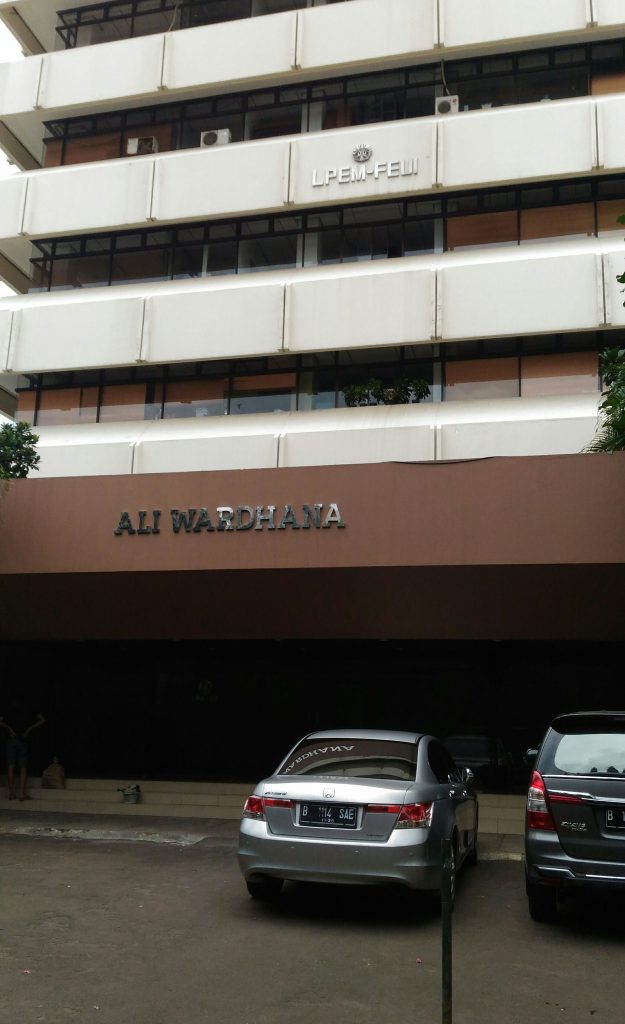Institute for Economic and Social Research – Faculty of Economics and Business, University of Indonesia, or better known as LPEM FEB UI, is a research institute under the Faculty of Economics and Business, University of Indonesia as well as the largest community of academic researchers at the University of Indonesia. For more than 60 years, LPEM FEB UI has become one of the leading academic institutions in Indonesia, which plays an important role in contributing ideas through research, consulting, and education.
History
The establishment of a research center within the academic community at the Faculty of Economics, University of Indonesia was spearheaded by Prof. Dr. Soemitro Djojohadikusomo. In 1953, Prof. Dr. Soemitro Djojohadikusomo, who was serving as the Dean of the Faculty of Economics, University of Indonesia, set up two research centers. They are called Seminar Business Administration and Social Research Center. The objective of establishing both research centers was to support the research activities by doctoral candidates. A year later, in November 1953, the Social Research Center was renamed into Institute for Economic and Social Research (LPEM FEB UI). In 1956, the Seminar Business Administration was merged into the LPEM FEB UI.
Activities
During its development, LPEM FEB UI has played an important role in research and educational activities. Most of its activities are collaboration with public or private entities, both within and outside the country. Government agencies or privates and foreign institutions who have become clients of LPEM for research activities namely: Bank Indonesia, Ministry of Finance, Ministry of Energy and Mineral Resources, Ministry of Trade, Ministry of Industry, Toyota Astra Motor, Sucofindo, MEDCO Group, Indosat, Indonesia Media , Surveyor Indonesia, The World Bank, Asian Development Bank (ADB), International Monetary Fund (IMF), The Asia Fundation, National Bureau of Economic Research (NBER), the Japan International Cooperation Agency (JICA), the Economic Research Institute for ASEAN and East Asia (ERIA), United Nations Development Programme (UNDP), the International Labour Organization (ILO), the World Trade Organization (WTO), United Nations Children’s Fund of Fund (UNICEF), and United States Agency for International Development (USAID). As for education trainings, LPEM have several clients that include: The National Development Planning Agency (Bappenas), the Secretariat General of the House of Representatives, the Regional Government of DKI Jakarta, The Meteorology, Climatology and Geophysics Agency (BMKG), and the Business Competition Supervisory Commission (KPPU). In the last 35 years, LPEM FEB UI has completed more than 700 research activities in various fields. To adapt with new opportunities, the institution is organized into seven research groups:
- Industrial Economics and Infrastructure Research Group
- Regional and Energy Resources Policy Research Group
- Macroeconomics and Financial Sector Policy Research Group
- Environmental Economics Research Group
- Digital Economy and Behavioral Economics Research Group
- Business Climate and Global Value Chains Research Group
- Social and Community Empowerment Research Group
Vision and Mission
Our vision is to become a leading research institute in social and economic field that benefits society and conforms to good governance. The missions of LPEM FEB UI are:
- To develop and maintain our best resource, which is our people, to conduct high quality research, consulting and training.
- To establish strong network and engage in good governance for the expansion of our multi-disciplinary field areas.
- To utilize decades of our experience to spread knowledge for effective public policies.
Core Values
- Veritas (Truth)
- Probitas (Uprightness)
- Iustitia (Justice)
Partnership Ethics
LPEM FEB UI seeks partnerships with other public and private institutions by following the guidelines set by University of Indonesia. You can read it in detail by opening this link. (it is available only in Bahasa Indonesia)

